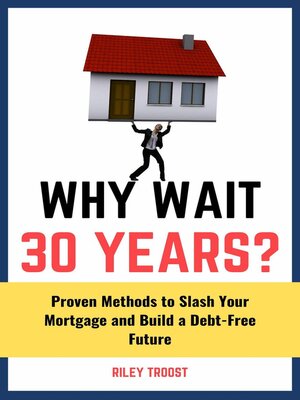Why Wait 30 Years?
ebook ∣ Proven Methods to Slash Your Mortgage and Build a Debt-Free Future
By Riley Troost

Sign up to save your library
With an OverDrive account, you can save your favorite libraries for at-a-glance information about availability. Find out more about OverDrive accounts.
Find this title in Libby, the library reading app by OverDrive.



Search for a digital library with this title
Title found at these libraries:
| Library Name | Distance |
|---|---|
| Loading... |
The traditional mortgage timeline has become a defining feature of financial planning, binding homeowners to decades of payments that siphon away opportunities for growth and freedom. Yet, this lengthy financial commitment is not an unchangeable rule but a system that can be maneuvered, accelerated, and even conquered. "Why Wait 30 Years?" unravels the structures of the mortgage system and equips you with actionable strategies to reclaim your financial independence long before the typical payoff date.
Mortgages are structured to serve lenders' interests more than homeowners'. The early years of payments are heavily weighted toward interest, creating a psychological and financial drag that discourages momentum. This book examines how this design traps individuals and families into a cycle of prolonged dependency. It provides insight into how subtle adjustments in your financial habits and payment strategies can tilt the scales in your favor, transforming what feels like an immovable burden into an opportunity for empowerment and growth.
Using clear, practical techniques, "Why Wait 30 Years?" introduces methods for minimizing the financial drag of interest payments and reducing the overall lifespan of your mortgage. The book demystifies key financial concepts, including biweekly payment systems, refinancing opportunities, and lump-sum strategies, breaking them down into straightforward steps that are easy to implement.
But this isn't merely a guide to faster payments. It's an approach to reshaping your financial mindset entirely. The book encourages you to look beyond the numbers and see the broader implications of living debt-free. By eliminating your mortgage early, you unlock the potential to reinvest your earnings in meaningful ways—whether through building wealth, pursuing passions, or securing a legacy for your family.
Each strategy in the book is presented with clarity and precision, ensuring that readers from all financial backgrounds can find solutions that resonate with their unique situations. Whether you're a first-time homeowner overwhelmed by the daunting timeline or someone halfway through a mortgage seeking to accelerate the finish line, the methods outlined in this guide are adaptable and practical. They address common obstacles such as limited income flexibility, fluctuating interest rates, and competing financial priorities, offering solutions grounded in discipline and foresight.
The book doesn't shy away from the psychological aspects of financial commitment. Mortgages often carry an emotional weight, symbolizing security while simultaneously breeding anxiety over long-term obligations. By addressing these emotional hurdles, "Why Wait 30 Years?" helps readers cultivate a sense of control over their financial destinies. It demonstrates that slashing decades off a mortgage is not simply about paying more but about paying smarter, building momentum, and maintaining consistency in the face of challenges.
Central to the book's philosophy is the power of compounding small changes. Instead of drastic overhauls, it advocates for incremental shifts in behavior—adjustments to spending habits, small increases in monthly payments, or reallocation of windfalls—that cumulatively lead to monumental results. These techniques are rooted in discipline and planning, offering a realistic pathway to financial freedom that feels achievable rather than overwhelming.
The strategies outlined in "Why Wait 30 Years?" also extend to fostering resilience against unforeseen economic changes. By proactively reducing debt, you position yourself to weather fluctuations in...







